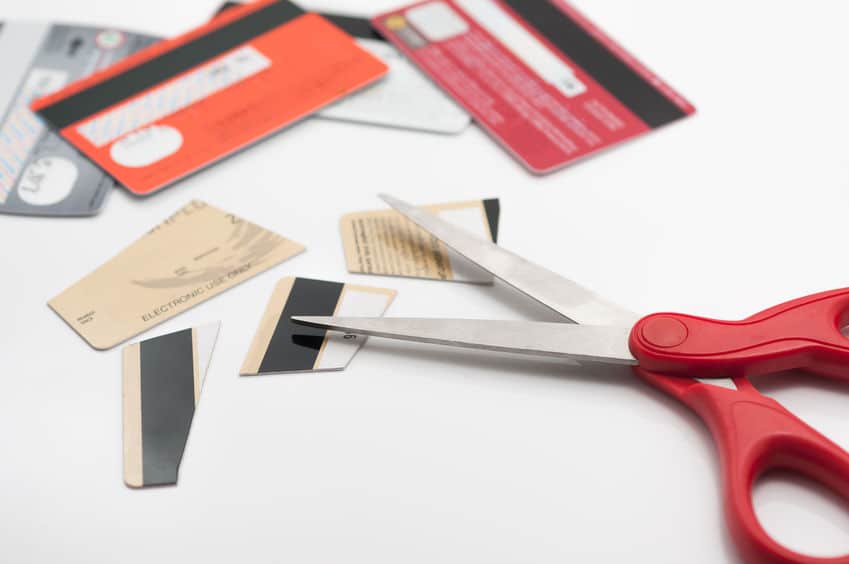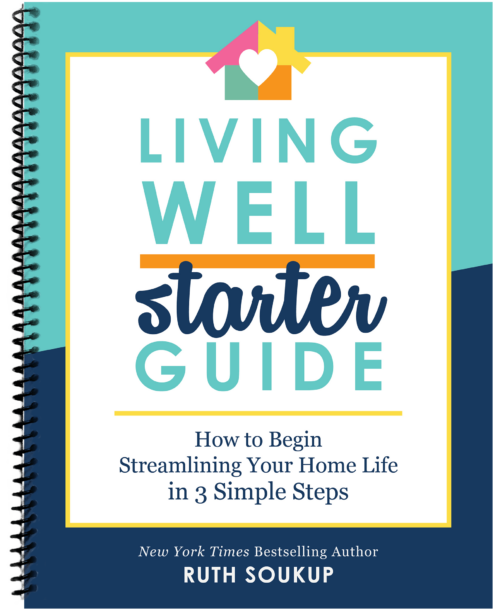For those of us who struggle with online shopping, the future can seem a bit, well, scary. Fifteen years ago, if I wanted to curb my shopping habit I would’ve just stayed home and avoided the store.
But now, wow, it’s just so EASY. I mean, you don’t even have to hit up a virtual store to shop. We’re constantly bombarded with opportunities to buy streaming music and video services, new apps, downloads, games, and more.
With Amazon Echo, Dash Buttons and Google Home, we can literally buy items simply by pushing a button or wishing for them out loud.
And especially when we’re struggling to get our finances under control, online shopping can become so tempting…even addicting. Just like a drug, we get a little rush of gratification when we purchase something online. It’s exciting! It’s fun to get things in the mail! The whole world of stuff is out there, waiting to be purchased!
The future is here…and I’m a little freaked.
We have to address our online shopping and rein it in. Money spent online (especially on all those little, intangible purchases) is still coming out of our wallets and adding to debt. If you’re working to tackle your debt or even go on a spending freeze, spending money online will work against your goals.
Now I’m not perfect at this. I LOVE a good deal, and it can be really hard not to spend money online. It’s always there and it’s always tempting. But if you’re trying to rein in your online spending, here are a few tips and tricks I’ve found helpful.
1. Make a Commitment
Any time we want to change or set a goal, the first step is committing to the goal. For me, I know if I write it down, tell my husband and add it to my calendar, it becomes more “real.” How we commit to committing can look a little different for each of us.
Your best bet? Make a commitment and say it or write it down. Put it in a place you’ll be reminded (like on a post-it on your computer). Each time you feel tempted to spend or when you get distracted by a sale, revisit your commitment and remind yourself why you want to achieve your goal. Is it to get out of debt? To spend less on stuff you don’t need? To teach your kids better values? Revisit your commitment and reasons each time you need a boost.

2. Write Out Your Budget and Limits
If you want to rein in your online spending, it helps to get a clear picture of where you are financially. If you have a budget, visit it and look at what you’re spending each month online. Examine your bank and credit card statements in case you forget about all those $1.99 app store charges or subscription fees.
If you need help setting up a budget, you can download this free budget worksheet. Look at areas you can cut back or places you’re overspending. For example, if you and your husband have music streaming accounts, perhaps you can combine them into one joint account. Look at your Hulu, Netflix and Amazon Prime accounts—can you get by with just one movie streaming service?
3. Cancel Email Alerts for Sales
Remember when we used to get catalogues in the mail? Tons of catalogues would pile up, and if you wanted to curb temptation, you’d just unsubscribe or throw them away, right? Well, you can do the same with the “sale” notifications in your inbox and alerts you receive.
Many stores and online retailers offer sales on a rotating schedule. For example, GAP and Old Navy offer some type of sale almost every week. Retailers know a sale creates a sense of urgency, so we’d “better buy now” lest we miss an opportunity. Turn off the sales notifications and you’ll stop feeling like you’re missing out.

4. Unplug If Necessary
We’re in a constant state of receiving information. Advertisements pop up on our screens and scroll across our inbox so often we hardly even notice them anymore. Sometimes we need a break to connect IRL (in real life) instead of being online. When we see streams of Facebook friends doing amazing things, wearing great clothes and getting more stuff, we can feel the urge to keep up.
The same goes for Pinterest and Instagram. When we’re scrolling through photos of ideas and “stuff” we need to buy, it can be hard to turn it off and tune it out. You don’t have to shut down social media, but give yourself an e-break once in a while. Spend a day outdoors with your family…without your phone.
5. Buy Based on Needs
It’s hard for me to pass up a sale, especially if it’s something I think we might need in the future. If I have a list though, and I know what I’m looking for, then I can usually stick to it. Just like you avoid those sale endcaps when you don’t want to be tempted at the store, avoid scrolling through and “pretend shopping”—you know, when you put things in your virtual cart to “think about it”?
Instead, when a need comes up, put the item on a list. When you go to the store or when you’re ready to buy several items together, then make your purchase and stick to just the items on your list. If you have to buy something like a new winter coat for your daughter, look for sales and coupon codes, comparison shop, and find the best deal, but stick to the item on your list, rather than adding tights, a sweater and a scarf.

6. Implement a Wait Period
Do you want to really get your online spending under control? Implement a mandatory waiting period. With Amazon Dash and other “instant order” services, we’re used to getting immediate gratification. When we want something, we get it right away.
Instead of clicking the instant you think of something you need, add it to your list. Wait three days (or however long works best for you). That gives you a chance to assess whether it was a real need or just an impulse buy. Think about items for a little while and sometimes you might find, like I do, you didn’t really want or need them in the first place.
7. Freeze, Hide or Cut up your Card
If you really have to wage war on your spending and you need to take some serious measures, take your credit card away altogether. Put it in the freezer in a jar of water. By the time the jar melts and your card is free, you’ll have had plenty of time to reflect on the purchase.
Alternatively, ask your spouse to hide your card from you (provided your spouse is on board with curbing online spending). If all else fails, we’ve all cut up a credit card before. If you have to go through the hassle of asking the bank to reissue a card, chances are you’ll probably decide the purchase isn’t really worth it.

8. Don’t Save your Information
My computer conveniently stores my credit card information for me. (I’ll bet yours does this too.) When I want to buy something, I just “autofill” and it goes right through. Many retailers also helpfully offer to store your information for future purchases.
To avoid the impulse buy, always opt NOT to save your information. Not only does it keep your identity and financial information safe and out of the hands of hackers, but it makes spending much less convenient. Instead of one click, you have to think about your purchase, find your card and enter in the information. It takes longer and gives you more time to change your mind.
9. Use the Buddy System
If you’re struggling to rein in your spending, consider enlisting an accountability buddy. Ask a trusted friend to check in with you once a week or every so often on how you’re doing with your spending goals. So often, when we’re battling overspending, we feel embarrassed and alone. We might feel silly that we don’t have enough self-control.
In truth, reining in our online spending is hard. Many of us have struggled with spending and debt. Asking a good friend to help you meet your goals will give you someone you can bounce things off of, and someone who will offer you support when it seems tough.

10. Set Goals & Rewards
When it comes to crushing your goals, you need to remember to “Treat Yourself.” Sometimes we forget that an important part of achieving goals is to have a reward to keep ourselves motivated and inspired as we work toward achieving things, especially hard things.
So, if you have a goal to curb your online spending, crush it, and reward yourself with something great—a day out with a friend, a trip to the salon, or how about uninterrupted time to do whatever you want?! Offer yourself little rewards along the way. For example, if you go a week without spending online, treat yourself! If you’re fighting the desire to click, try painting your nails, baking something you’ve been wanting to try, or reading a book you can’t put down.
Remember, doing anything new is hard. If you’ve been relying on the convenience of online shopping for a while, chances are it’s become a habit and you need to give yourself some time to rein in your clicking. You have to retrain yourself to do something different, rather than relying on your go-to methods of spending.
Reining in online spending is hard, but we can do it! Using these tips and tricks, we can start to form better habits that don’t derail our financial goals!

TAKE BACK CONTROL OF YOUR HOME LIFE
 Ever feel like you just can't keep up? Our Living Well Starter Guide will show you how to start streamlining your life in just 3 simple steps. It's a game changer--get it free for a limited time!
Ever feel like you just can't keep up? Our Living Well Starter Guide will show you how to start streamlining your life in just 3 simple steps. It's a game changer--get it free for a limited time!
If you love this resource, be sure to check out our digital library of helpful tools and resources for cleaning faster, taking control of your budget, organizing your schedule, and getting food on the table easier than ever before.










Something that helped me go from a shopping lawyer to a personal finance blogger and financial planner who never uses a credit card was focusing on creating instead of consuming. My blog has been the perfect outlet for this. I barely shop now and didn’t really have to try to stop.